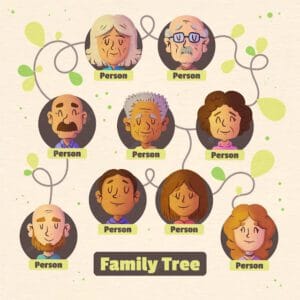Ancestry – The Basics You Need to Know
 |
| Image Source: FreeImages |
Everyone has ancestors from the past. Ancestors are people from your past, either directly from your parents or grandparents or even earlier than that. They are not necessarily blood relatives; rather, they are simply people who lived before you and who have descendants in the present time. Uncovering one’s ancestors is the primary objective of studying ancestry. There is a lot to be learned about your family tree once you start tracing back its roots. This article aims to provide readers with an overview of what ancestry is, why we study it, and how it is done. Keep reading to learn more!
What is the Study of Ancestry? : Genealogy
The study of ancestry is the process of discovering your ancestors and tracking down their origins. This can be done by studying documents that were left behind by previous generations, and it can also be done by tracing your DNA to see which regions of the world your genes are from. It is important to remember that ancestry is not the same as genealogy. Genealogy refers to the process of recording your research in a detailed family tree. This can be helpful for various reasons, such as confirming your family’s medical history, discovering relatives that may be unidentified, or finding out who gets to take possession of your belongings when you die. However, it is important to note that ancestry and genealogy are two different fields of research.
Why Study Ancestry?
The reason why you should study ancestry is that it can tell you a lot about yourself, your family, and your cultural heritage. For example, it can reveal where your family members came from (their place of origin or place of birth). It can also show you which ethnic or cultural group they belong to, as well as their linguistic or religious background. By studying your ancestry, you can also learn about your family’s past. You can discover details such as your family’s occupation or the type of income they earned, the type of home they lived in, and their level of education. You can even learn more details about the health issues that have plagued your family members, as well as their life expectancy, and other such facts.
How to Study Ancestry?
As discussed above, you can study your ancestry by tracing your family tree back as far as possible. This will allow you to track down your ancestors, and then discover more about them and what their lives were like. – Note: The further back you go, the less detailed the information may be. – If you are going to study your ancestry, it is important that you have access to documents that were left behind by your ancestors. These documents can include things like diaries, letters, newspaper clippings, books, and other written material. – You can also enlist the help of your relatives. Your relatives can provide you with valuable insight into your family members, as well as the events that took place during their lifetimes.
3 Steps to Finding Your Ancestry Using Record Research
– Start by researching your family’s origins. This can be done by searching for your family members in census records and public genealogy databases like Ancestry.com. – Once you have determined your family’s place of origin, you can then move on to researching immigration records. These records can give you more details about when and why your ancestors left their place of origin. – Finally, you can then look into settling records in order to discover where your ancestors settled after migrating.
2 Steps to Finding Your Ancestry Using a DNA Test
Collect a sample of your DNA. This can be done by visiting a lab and having a sample of your saliva collected for this purpose. – Analyzing your DNA sample. Once your DNA sample has been collected, it will be analyzed to determine which genetic markers you have inherited. – Discovering your ancestry. After analyzing your DNA sample, you will be able to discover your ancestry and the regions of the world that your genes are from. This can help you discover more about your cultural heritage.
Conclusion
The study of ancestry is an extremely important one. It allows us to know more about who we are and where we came from. It also helps to reveal our cultural and ethnic background, as well as our linguistic and religious affiliations. The more we study our ancestry, the more we can learn about our past and ourselves.